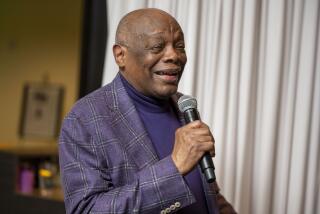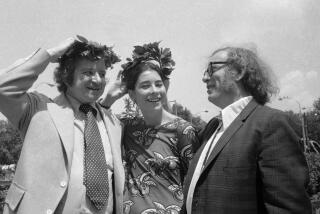Frank M. Robinson dies at 87; author and Harvey Milk speechwriter
Frank M. Robinson, an author of thrillers and science fiction who also helped slain San Francisco supervisor Harvey Milk craft some of his most powerful speeches, has died. He was 87.
Robinson’s June 30 death while under hospice care at his San Francisco home was confirmed by Daniel Nicoletta, a longtime friend who, like Robinson, was part of Milk’s inner circle. Robinson had a history of heart problems, Nicoletta said.
------------
FOR THE RECORD
July 11, 11:34 a.m.: An earlier version of this obituary said Harvey Milk was the first openly gay American elected to prominent office. He was one of the first.
------------
As a fiction writer, Robinson told stories set in burning skyscrapers, sinister hospitals and Utopian spaceships drifting a thousand generations into the future. With Thomas Scortia, he wrote “The Glass Inferno,” a 1974 novel about a catastrophic blaze. It, along with Richard Martin Stern’s “The Tower,” formed the basis of the 1974 blockbuster movie “The Towering Inferno.”
A sci-fi fan since his teenage years, Robinson also made a living in nonfiction.
Without revealing his gay identity, he wrote Playboy magazine’s Playboy Advisor column from 1969 to 1973.
“I didn’t trust the outside world,” he told the Portland Oregonian in 2008. “I was frightened. Frightened I’d lose my job and my friends.”
At the same time, Robinson wrote and edited “Chicago Gay Pride,” a 1971 publication that promoted the city’s Pride Parade. He kept his byline out of it.
Moving to San Francisco in 1973, he did not intend to throw himself into politics. But strolling by Milk’s camera shop in the Castro district, he befriended the man who was to become one of the first openly gay Americans elected to a prominent office.
Milk had won 15,000 votes in an earlier, unsuccessful bid for supervisor. Now he was running again and was looking for a speechwriter.
“I never for a moment thought he would win anything,” Robinson later wrote. Still, he signed on.
Robinson worked on Milk’s stirring “You’ve Got to Have Hope” speech — a call for gay pride that included Milk’s recounting of an anguished call from a confused young boy in Altoona, Pa.
“Harvey polished the speech and used it often,” Robinson wrote in his foreword to a collection of Milk’s writings, “though the rest of us kidded him because some days the boy lived in Altoona, other times in San Antonio or Buffalo. The boy really got around, we thought.”
Eventually, Robinson became such a trusted advisor that Milk, preoccupied with the possibility of his own assassination, left a “political will” designating him as his preferred successor.
“If there were any problems, he would be able to carry on the philosophy and idea of what I stood for,” Milk said in a 1977 tape recording he left with his attorney.
On Nov. 27, 1978, Milk and San Francisco Mayor George Moscone were shot to death by former supervisor Dan White.
Always uncomfortable in the limelight, Robinson never sought office and continued to write books.
Born in Chicago on Aug. 9, 1926, Frank Malcolm Robinson served in the Navy as a radar technician during World War II and the Korean War. Between his tours of duty, he graduated from Beloit College in Wisconsin. He later received a master’s degree in journalism from Northwestern University.
He wrote or co-wrote more than a dozen works, including coffee-table books that reflected his passion for garishly illustrated, campy pulp magazines.
His 1956 novel “The Power” was about a murderous superman with psychic powers. In 1968, it was turned into a film starring George Hamilton and Suzanne Pleshette.
His 1991 novel “The Dark Beyond the Stars” received a Lambda Literary Award for gay men’s science fiction and fantasy.
Robinson’s stories feature occasional bisexual or gay characters but are not built around gay themes, said Robin Wayne Bailey, a novelist and past president of Science Fiction and Fantasy Writers of America.
“He used to say he was never in the closet but he was never out waving the flag every day either,” Bailey said.
Persuaded by director Gus Van Sant, Robinson reluctantly played a cameo role as himself in the 2008 film “Milk.” The scene involved one of Milk’s pet crusades — cleaning up after dogs in public spaces — and Robinson’s only word was one in common use to describe dog droppings.
“I said I thought I could manage that,” Robinson recalled, “and my career as a movie star was born.”
Robinson leaves no immediate survivors.
Twitter: @schawkins
More to Read
Start your day right
Sign up for Essential California for the L.A. Times biggest news, features and recommendations in your inbox six days a week.
You may occasionally receive promotional content from the Los Angeles Times.







